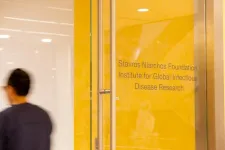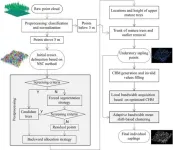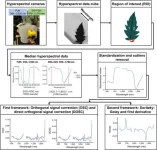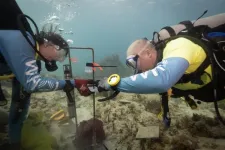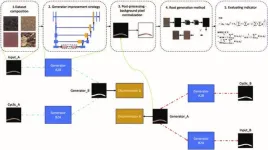(Press-News.org) From identifying the influenza virus that caused the pandemic of 1918 to developing vaccines against pneumococcal pneumonia and bacterial meningitis in the 1970s, combating infectious disease has a rich history at Rockefeller. That tradition continues as the Stavros Niarchos Foundation Institute for Global Infectious Disease Research at Rockefeller University (SNFiRU) caps a successful first year with the establishment of a new advisory board.
This international advisory board was created in part to give guidance on how to best use SNFiRU’s resources, as well as bring forward innovative ideas concerning new avenues of research, public education, community engagement, and partnership projects.
SNFiRU was established to strengthen readiness for and response to future health crises, building on the scientific advances and international collaborations forged in the context of the COVID-19 pandemic. Launched with a $75 million grant from the Stavros Niarchos Foundation (SNF) as part of its Global Health Initiative (GHI), the institute provides a framework for international scientific collaboration to foster research innovations and turn them into practical health benefits.
SNFiRU’s mission is to better understand the agents that cause infectious disease and to lower barriers to treatment and prevention globally. To speed this work, the institute launched numerous initiatives in its inaugural year. For instance, SNFiRU awarded 31 research projects in 29 different Rockefeller laboratories for over $5 million to help get collaborative new research efforts off the ground. SNFiRU also supports the Rockefeller University Hospital, where clinical studies are conducted, and brought on board its first physician-scientist through Rockefeller’s Clinical Scholars program. “One of the surprises was the scope of interest from Rockefeller scientists in using their talents to tackle important infectious disease problems,” says Charles M. Rice, Maurice R. and Corinne P. Greenberg Professor in Virology at Rockefeller and director of SNFiRU. “The research topics range from the biology of infectious agents to the dynamics of the immune response to pathogens, and also include a number of infectious disease-adjacent studies.”
In the past 12 months, SNFiRU often brought together scientists studying different aspects of infectious disease as a way to spur new collaborations. In addition to hosting its first annual day-long symposium, SNFiRU initiated a Young Scientist Forum for students and post-doctoral fellows to meet regularly, facilitating cross-laboratory thinking. A bimonthly seminar series has also been established on campus.
Another aim of SNFiRU is to develop relationships with community-based organizations, as well as design and participate in community-engaged research, with a focus on low-income and minority communities. To that end, SNFiRU is helping develop a research project on Chagas disease, a tropical parasitic infection prevalent in Latin America that can cause congestive heart failure and gastrointestinal complications if left untreated. The project will bring together clinicians practicing at health centers in New York, Florida, Texas, and California and basic scientists from multiple institutions to help the communities that are most impacted.
“The SNFiRU international advisory board convenes globally recognized leaders with distinguished biomedical expertise, unrivalled experience in pandemic preparedness and response, and a shared commitment to translating scientific advancements into equitably distributed benefits in real-world settings,” says SNF Co-President Andreas Dracopoulos. “The advisory board will advance the institute's indispensable mission, which SNF is proud to support as a key part of our Global Health Initiative, and we look forward to seeing breakthroughs in the lab drive better outcomes in lives around the globe.”
The new advisory board will hold its first meeting on April 11th, 2024, following the second annual SNF Institute for Global Infectious Disease Research Symposium at Rockefeller.
Its members are: Rafi Ahmed of Emory University School of Medicine, Cori Bargmann of The Rockefeller University, Yasmin Belkaid of the Pasteur Institute, Anthony S. Fauci, the former director of the National Institute of Allergy and Infectious Diseases, Peter Hotez of Baylor College of Medicine and Texas Children’s Hospital Center for Vaccine Development, Esper Kallas of of the Butantan Institute, Sharon Lewin of the University of Melbourne Doherty Institue, Carl Nathan of Weill Cornell Medicine, Rino Rappuoli of Fondazione Biotecnopolo di Siena and University of Siena, and Herbert “Skip” Virgin of Washington University School of Medicine and UT Southwestern Medical Center.
END
The SNF Institute for Global Infectious Disease Research announces new advisory board
2024-03-13
ELSE PRESS RELEASES FROM THIS DATE:
How the brain wakes us from daydreams
2024-03-13
When we daydream, we must be able to snap back to attention at a moment’s notice. Researchers at Boston Children’s Hospital uncovered how our brains can do things like react to a question when we’re daydreaming: firing activity in part of the brain called the dentate gyrus keeps us focused on what’s happening in our environment. And the team found that the same neural activity also helps with forming memories. The findings were published in Nature on March 13, 2024.
“We have found a brain mechanism for breaking up periods of mind wandering and realigning the ‘cognitive ...
Revolutionizing forest management: unveiling understory saplings with advanced airborne LiDAR technology
2024-03-13
The regeneration of forest saplings is pivotal for maintaining biodiversity and ecosystem productivity, necessitating innovative management techniques for continuous forest coverage. Traditional 2-dimensional remote sensing struggles to accurately capture the complex, understory sapling dynamics. To address this, researchers are exploring the use of aerial laser scanning (ALS) for its potential in providing detailed 3-dimensional insights. However, despite progress in using ALS data to estimate tree metrics, accurately identifying and quantifying the phenotypic ...
High resolution imagery advances the ability to monitor decadal changes in emperor penguin populations
2024-03-13
Woods Hole, Mass. (March 13, 2024) - Emperor penguin populations have been exceedingly difficult to monitor because of their remote locations, and because individuals form breeding colonies on seasonal sea ice fastened to land (known as fast ice) during the dark and cold Antarctic winter.
Now, new research that incorporates very high resolution (VHR) satellite imagery with field-based validation surveys and long-term data has provided the first multi-year time series that documents emperor penguin global population trends.
Researchers ...
Gilbert H. L. Tang appointed Editor-in-Chief of JACC: Case Reports
2024-03-13
Renowned cardiovascular surgeon Gilbert H. L. Tang has been named Editor-in-Chief of JACC: Case Reports, bringing a wealth of experience and expertise to the helm of one of the top cardiovascular journals published by the American College of Cardiology.
“I am both honored and humbled to be a cardiac surgeon among the Editor-in-Chiefs in the JACC family of journals,” Tang said. “It is going to be an exciting time for JACC: Case Reports to build on a team of multidisciplinary cardiovascular practitioners with diverse backgrounds and experiences, and at different stages of their professional careers, to enhance the journal’s academic and educational impact globally.”
Tang ...
Enhancing crop nutritional analysis: a leap towards precision agriculture with multi-target regression and hyperspectral imaging
2024-03-13
Recent advancements in hyperspectral imaging and machine learning have revolutionized the non-destructive monitoring of crop nutritional status, enabling accurate prediction of plant element concentrations. Despite successes, the single-target regression method, which predicts concentrations individually, faces accuracy limitations for certain elements. Traditional methods offer accuracy but at the cost of being destructive and inefficient for large-scale use. Current research highlights the potential of multi-target ...
Sonic youth: Healthy reef sounds increase coral settlement
2024-03-13
Woods Hole, Mass. – A healthy coral reef is noisy, full of the croaks, purrs, and grunts of various fishes and the crackling of snapping shrimp. Research suggests that larval animals use this symphony of sounds to help them determine where they should live and grow.
Researchers at the Woods Hole Oceanographic Institution (WHOI) recently demonstrated that replaying healthy reef sounds could potentially be used to encourage coral larvae to recolonize damaged or degraded reefs. A reef that has been ...
Warwick awarded £11 million to train PhD students in computational modelling
2024-03-13
The University of Warwick has been awarded £11m to train PhD students in computational modelling.
The new centre will train 50 PhD students to use computational modelling to tackle pressing global sustainability challenges from accessing clean fusion energy, controlling infectious diseases, to designing energy-efficient devices such as new battery electrolytes.
The Centre for Doctoral Training in Modelling of Heterogeneous Systems (HetSys II), led by Professor James Kermode from the School of Engineering, Dr Livia Bartok-Partay from Chemistry and Professor Nicholas Hine from Physics, will train ...
Simple trick could improve accuracy of plant genetics research
2024-03-13
Researchers have published a simple trick that improves the accuracy of techniques that help us understand how external variables – such as temperature – affect gene activity in plants.
“There are really two contributions here,” says Colleen Doherty, corresponding author of a paper on the work and an associate professor of molecular and structural biochemistry at North Carolina State University. “First, we’re raising the visibility of a problem that many of us in the ...
Revolutionizing plant science: a groundbreaking method for expanding in situ root datasets using CycleGAN
2024-03-13
The root system is crucial for plants to absorb water and nutrients, with in situ root research providing insights into root phenotypes and dynamics. While deep-learning-based root segmentation methods have advanced the analysis of root systems, they require extensive manually labeled datasets, which are labor-intensive and time-consuming to produce. Current methods of in situ root observation vary in their effectiveness. Moreover, traditional root image recognition methods face challenges such as subjectivity and ...
COVID-19 rebound after VV116 vs nirmatrelvir-ritonavir treatment
2024-03-13
About The Study: In this randomized clinical trial of 345 patients with mild-to-moderate COVID-19, viral load rebound and symptom rebound were both common after a standard 5-day course of antiviral treatment with either VV116 or nirmatrelvir-ritonavir. Prolongation of treatment duration might be investigated to reduce COVID-19 rebound.
Authors: Yufang Bi, M.D., and Yiping Xu, M.Sc., of the Shanghai Jiao Tong University School of Medicine in Shanghai, China, are the corresponding authors.
To access the embargoed study: Visit our For ...
